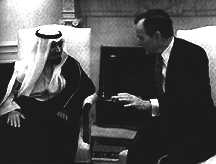 [WesMaps 98/99 Home Page]
[Course Search]
[Course Search by CID]
[WesMaps 98/99 Home Page]
[Course Search]
[Course Search by CID]
| Section | Class Size | *Available | Times | POI | Prereq |
|---|---|---|---|---|---|
| 1 | 25 | 1 | Times: M.W.... 1:10PM-2:30PM; | No | Yes |

The end of the Cold War marked a turning point in American foreign policy, a time for rethinking both means and ends. It prompts us to review the conventional assumptions of the preceding 50 years and a test of their relevance for the future. To ground predictions about the future in knowledge of the past, the first half of the course examines the history of U.S. foreign policy. We will give special attention to ways in which competing views of foreign policy shaped past decisions and drive contemporary debates. During the second half of the course, we will examine the assumptions of several major approaches to the conduct of foreign policy and trace their implications for current policy issues. The focus will be on key issues such as regional policy toward Europe, Asia and the Middle East as well as nuclear proliferation, trade and intervention policy that face architects of a new United States foreign policy.
COURSE FORMAT: Discussion Lecture
Level: UG Credit: 1.00 Gen Ed Area & Dept: SBS GOVT
Prerequisites: GOVT155
Last Updated on MAR-22-1999
Copyright Wesleyan University, Middletown, Connecticut, 06459